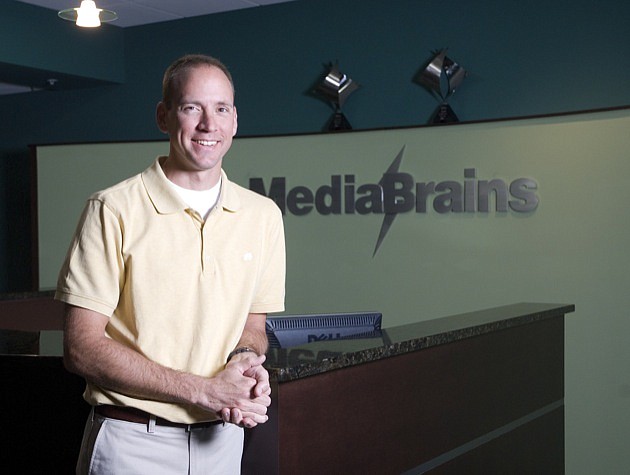REVIEW SUMMARY
Company. MediaBrains
Industry. Technology
Key. Don't show fear and learn from mistakes.
If you're a survivor of the tech bust, this date is probably seared in your brain: March 10, 2000.
That's the day the Nasdaq composite index peaked at 5,049, nearly double what it is even today, 10 years later.
But that date holds special meaning for Joe Buckheit, president and CEO of MediaBrains in Naples. Besides being his birthday, it's also the day he raised $13.5 million in venture capital and installed a new CEO.
“The money lasted a year and the CEO lasted a year,” Buckheit quips. It wasn't until 2007 that Buckheit was able to buy back and regain control of the company he founded a dozen years ago.
Now running a profitable online-directory business, Buckheit, 39, looks back to those heady days as free tuition. “That was my executive MBA,” he says. Buckheit ticks off the business-school lessons he learned on the job: Focus on the customer, know your market, understand the cost of product development.
Buckheit had to learn those lessons quickly because the tech boom ended in a spectacular bust. “He had a business at the time that was still losing money and he was able to get it to profitability by changing the business model,” says Jim Collis, partner at Seaport Capital in New York City and one of Buckheit's venture partners who was on the company's board from 2000 until 2009.
Even during the depths of the tech bust, Buckheit's colleagues say he never lost his cool. “He teaches you not to be afraid of fear, staying strong and making it through,” says Gina Paddock, MediaBrains' vice president of sales who has worked with Buckheit for 11 years.
Today, MediaBrains publishes online directories for publishers and for its own account and sells advertising in those directories. Buckheit declines to cite annual revenues, but says annual sales are in line with online-advertising industry increases in the 30% range.
Bust-tested
Buckheit is one of the few executives whose business was funded late in the tech boom and survived the ensuing bust.
On the morning of Sept. 11, 2001, Buckheit was eating breakfast in New York City with the CEO of his biggest client at the Roosevelt Hotel. “We're cancelling our contract,” the client told Buckheit bluntly.
The stunning news that Buckheit would lose his biggest customer responsible for 50% of sales wasn't the worst thing to happen that day. A few hours later, two airplanes piloted by terrorists slammed into the World Trade Center twin towers. “By then, we were out of money,” Buckheit recalls.
At the next board meeting, Buckheit came with his resignation letter and a plan to turn the company around. “A week later, I was the CEO,” he says.
Buckheit had to make some difficult decisions immediately. He laid off 60 people, closed the company's New York City office and focused on an old-media business that had taken a back seat during the boom. “We went back to our first product: processing leads from print advertisers,” Buckheit says.
MediaBrains had become skilled at collecting advertising reader-response cards from magazine publishers, the first business it launched. Called “bingo cards” in the trade, these cards have numbers that correspond to ads in the magazine and readers circle the numbers and mail the cards in to receive more information from advertisers.
But that business had taken a back seat to the online business-to-business directories that became popular during the Internet boom. In 2001, a severe advertising downturn crushed many publishers and they subsequently slashed businesses that weren't profitable, including online directories. “We're not making money on it,” Buckheit's largest customer told him on that Sept. 11 morning.
So Buckheit focused on processing profitable bingo cards, doing it better and for lower costs by using the Internet instead of old mainframe computers that its competitors still relied on. Buckheit's strategy was simple: Learn everything about a competitor, figure out its business, identify its weakness and use that information to grab market share.
By 2005, MediaBrains had lowered its expenses and captured enough market share that it had the cash flow to acquire two main competitors in the bingo-card business. “Joe was able to bring them in and deliver 60% margins,” says Collis.
In 2007, Buckheit sold the bingo-card business for an undisclosed sum and bought out his venture partners to regain control of MediaBrains. It had taken one year to spend the venture capital money and seven years to make it back.
Back to directories
By 2005, Buckheit concluded that publishing business directories could be a good business again. But instead of selling software to publishers and collecting a licensing fee as it had done previously, MediaBrains would create the content, sell advertising and split the revenues with publishers.
While print advertising languished during this recession, MediaBrains has benefited from the shift to online advertising. More than 4,000 advertisers now spend from $400 to $10,000 a year to reach online readers of sites such as BtoB, a magazine that targets marketing professionals.
MediaBrains also publishes directories for its own account too. For example, it publishes Medicaldevicedirectory.com, a site devoted to medical equipment manufacturers. “In those cases we have to invest in the brand,” Buckheit says.
Success at MediaBrains has allowed Buckheit to focus on other ventures, including Agingcare.com, a Web site devoted to those who care for elderly people he launched in 2007.
Buckheit started Agingcare.com after kitchen-table discussions with his parents and in-laws about the challenges of elder care. He realized there was no central online forum for caregivers to discuss the challenges elder care. Buckheit expects the site will return his investment in it by next year, selling advertisements to those companies that want to reach caregivers.
Paddock says starting a new venture isn't unusual for her boss. “He likes having a bunch of circles going on at one time,” she says.
Cool, collaborative style
Colleagues say Joe Buckheit's management style helped employees at Naples-based MediaBrains manage through the dark days of the tech bust and the advertising downturn. His leadership style also encouraged them to identify and seize opportunities when they came along.
“He's not a screamer or a yeller,” says Jim Collis, partner at Seaport Capital in New York City. “I've not seen him get upset.”
Gina Paddock, MediaBrains' vice president of sales, says that in 11 year working with Buckheit, she's never heard the president and CEO raise his voice. “That makes him more intimidating,” she chuckles.
Collis says it's unusual for someone like Buckheit, who was trained as a computer programmer at Syracuse University, to manage people well. “He's got better people skills than your typical programmer,” he says.
“Joe thinks before he speaks,” Collis adds. “He thinks through a problem from start to finish.”
While Collis and Paddock say Buckheit is smart, they both say he gives weight to other peoples' opinions before making a decision. “He understands he doesn't know everything,” Collis says. “He has a hands-off style, to some extent.”
To create a collaborative atmosphere, the office kitchen is where employees meet most often to discuss ideas. “We designed the kitchen with a TV to be a meeting space,” Paddock says. Office walls are magnetic so that employees can toss up charts to share ideas informally.
“He never asks people to do what he wouldn't do,” Paddock says. “He tries to tell people not to be afraid of failure.”
But Buckheit does dig deeply to understand why people make mistakes or don't reach their goals. “It's sometimes a painful process,” Paddock acknowledges. “You have to have facts. He doesn't run on emotion.”
This collaborative style doesn't mean Buckheit is detached, however. A triathlete who has competed in Ironman competitions, Buckheit doesn't sit still. “He starts his day at 5 a.m. and runs 10 miles,” Paddock says. “He's one of those guys.”






